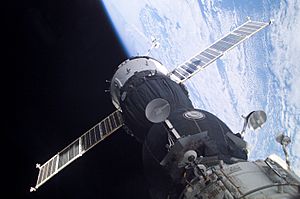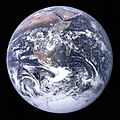Time dilation facts for kids

Time dilation is a fascinating idea from Einstein's theory of relativity. It means that time can actually pass differently for different people or objects. Imagine two clocks: if one is moving very fast or is near something super heavy, it might tick slower than the other! This happens because of how spacetime works.
Contents
What is Time Dilation?
Time dilation describes a difference in how much time passes for two different observers. This difference can happen for two main reasons. First, if the observers are moving at different speeds compared to each other. Second, if they are in different places within a gravitational field.
Time and Speed
When something moves very fast, like a spaceship, time slows down for it compared to something that is standing still. This is because of the nature of spacetime. A clock that is moving will be measured to tick slower than a clock that is not moving from your point of view. This effect is usually tiny, but it becomes more noticeable at very high speeds.
Time and Gravity
Time can also slow down if you are in a strong gravitational field. Imagine being very close to a giant planet or a black hole. Time would pass slower for you there than for someone far away where gravity is weaker. This is another way time dilation works.
Real-Life Examples
Scientists have proven time dilation many times. For example, they have sent atomic clocks into space. When these super-accurate clocks returned, they showed a tiny difference in time compared to clocks that stayed on Earth.
Clocks on the Space Shuttle also ran a little slower than clocks on Earth. Also, the clocks on GPS and Galileo satellites actually run slightly faster. This is because they are further from Earth's gravity. For GPS to work correctly, these satellites must adjust their clocks to match Earth's time. Without these adjustments, your GPS would not be accurate!
Even astronauts on the International Space Station (ISS) experience time dilation. The ISS orbits Earth very fast, at about 7,700 meters per second. After six months on the ISS, an astronaut would have aged about 0.005 seconds less than people on Earth. Cosmonauts Sergei Krikalev and Sergei Avdeyev experienced about 20 milliseconds of time dilation.
Time Travel Dreams
Time dilation has often been a topic in science fiction stories. In theory, it could allow people in a very fast-moving vehicle to travel further into the future in a short amount of their own time. If you could travel fast enough, one year of your journey might mean ten years have passed on Earth!
However, with today's technology, space travel is not fast enough for us to experience big differences in time. The effects we see are very small.
Images for kids
-
Atomic Clock FOCS-1 (Switzerland), one of the most accurate devices for measuring time in the world. It stands in a laboratory of the Swiss Federal Office of Metrology METAS in Bern
See also
 In Spanish: Dilatación del tiempo para niños
In Spanish: Dilatación del tiempo para niños





